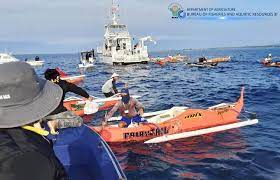MORE THAN a hundred fisher folks learned how to identify, assess, and address other risks and hazards attached to their livelihood during the Work Improvement in Small Enterprises (WISE) for the COVID Plus training seminar at The Ritz Hotel on Tuesday.
The Department of Labor and Employment (DOLE), in partnership with the International Labor Organization (ILO), Occupational Safety and Health Network (OSHNet) XI, and the City Agriculturist’s Office (CAgrO) conducted the training.
Of the 124 participants, 100 were fisherfolks from the 24 coastal barangays of Davao City who received motorized fishing boats distributed by the government under the DOLE Integrated Livelihood Program (DILP) conducted in July last year.
Aimee Evora, acting head of the CAgrO-Fisheries Resources Management Services Division, said that educating the city’s fisherfolk on occupational safety is essential with the various risks attached to the fisheries sector.
“Pinaagi ani nga training, atong matudluan, ma-guide ang atoang mga fisherfolk sa paglikay sa mga hazards kay kabalo man ta na atong fisherfolk exposed sila klase-klase na hazard during sa pagpanagat. So, kani na training dako kaayo og tabang para ma-ensure na safe sila og healthy sa ilang pagpanagat (Through this training, we can teach our fisherfolk to avoid hazards because we know that they are exposed to many hazards when they go fishing. So this training is a big help to ensure that they are safe and healthy as they fish,” said Evora.
Evora said that the city’s fisherfolk sector is a key contributor to food security and must therefore be assisted and protected.
She added that they were hoping the participants would share their learnings with members of their communities.

Aside from immediate health and safety risks, the participants were also given lectures on mental health and wellness, good sleeping and eating habits, proper labelling and segregation of tools and other health and safety practices.
These lectures were given by consultants and experts from DOLE, OSHNet, CAgrO, the Bureau of Fire Protection and other speakers from various agencies.
The WISE for COVID training was also attended by medium, micro and small enterprises (MSMEs) owners and cooperatives. Some were business owners of tailoring shops, bakeries, retail/wholesale stores, and food service businesses.
ILO Philippines project coordinator Josefa Bacal said the training, as part of the “Bringing Back Jobs Safely Under the COVID-19 Crisis in the Philippines” program funded by Japan, aims to assist the recovery of MSMEs affected by the pandemic.
OSHNET-XI president Florife Gallarde said the safety standards imparted during the training are as mandated in the Republic Act No. 11058 or “An Act Strengthening Compliance with Occupational Safety and Health Standards.”
The ILO provides the action checklist used to evaluate the safety practices of the participants and accurately determine the risk factors surrounding them.
